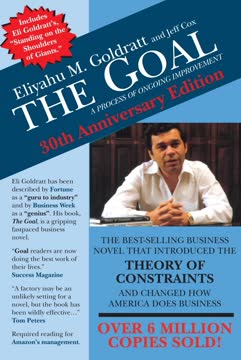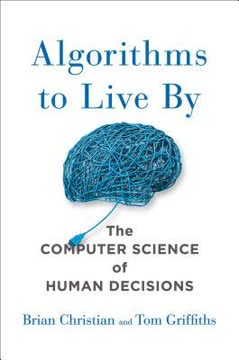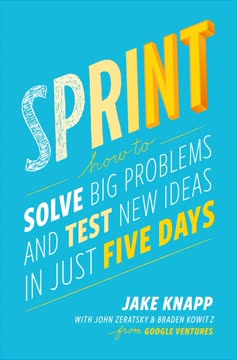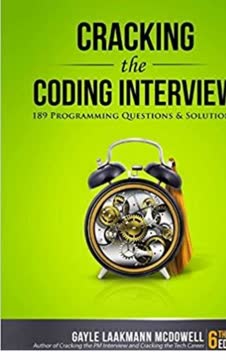Key Takeaways
1. Master the art of résumé crafting to stand out in the tech industry
"A good résumé clearly highlights a candidate's relevant skills. It must present the candidate in the best possible light because, after all, it is one's first chance to persuade the reader that she is the best candidate for the job."
Highlight accomplishments, not responsibilities. Your résumé should be a collection of your most impressive achievements, quantified whenever possible. Use action verbs and focus on results, not just duties. For example, instead of "Analyzed new markets," write "Led entrance strategy for Foobar product in China, resulting in a 7% increase in profits."
Tailor your résumé to the job. Customize your résumé for each position, emphasizing the skills and experiences most relevant to that specific role. Research the company and position to understand what they're looking for, and adjust your résumé accordingly.
Keep it concise and well-structured. Limit your résumé to one page if you have less than 10 years of experience. Use a clean, professional format with consistent styling. Include sections for:
- Contact information
- Summary or objective statement (if necessary)
- Work experience
- Education
- Skills
- Projects (especially for software engineering positions)
2. Leverage networking and personal connections to land interviews
"Personal referrals are, hands down, the best way to get a job. Not only will a company be more likely to consider someone who's been referred, but you'll also be more likely to find a position that matches your skills and interests. It's a win-win."
Build and maintain your network. Actively cultivate relationships with professionals in your field:
- Attend industry events and meetups
- Engage in online communities and forums
- Connect with alumni from your school
- Participate in hackathons or open-source projects
Utilize social media strategically. LinkedIn is crucial for professional networking, but don't overlook other platforms:
- Share industry-related content on Twitter
- Join relevant Facebook groups
- Contribute to discussions on platforms like Reddit or Stack Overflow
Seek informational interviews. Reach out to professionals in roles or companies you're interested in. Ask for 15-30 minutes of their time to learn about their experiences. This can often lead to job opportunities or referrals down the line.
3. Prepare strategically for behavioral and technical interviews
"Interviews are supposed to be difficult. If you don't get every—or any—answer immediately, that's OK! In fact, in my experience, maybe only 10 people out of the 150+ that I've interviewed have gotten the algorithm right instantly, and all but one of them made later mistakes on the coding."
Master common interview types:
- Behavioral: Prepare stories using the STAR method (Situation, Task, Action, Result)
- Technical: Practice coding on a whiteboard and explaining your thought process
- System design: Learn to discuss trade-offs and scalability issues
- Brain teasers: Focus on your problem-solving approach, not just the answer
Create a preparation grid. Organize your experiences and projects into a grid, with columns for each project and rows for common interview questions (e.g., challenges faced, lessons learned, conflicts resolved). This helps you quickly recall relevant examples during interviews.
Practice, practice, practice. Conduct mock interviews with friends or use online platforms. Focus on:
- Communicating clearly and concisely
- Asking clarifying questions before solving problems
- Thinking out loud to demonstrate your problem-solving process
- Handling criticism and feedback gracefully
4. Navigate the offer negotiation process with confidence
"Even if you don't intend to have some massive blowout quitting ceremony, your departure is still likely to be a sensitive time, and it's all too easy to burn bridges. It's too small a world out there to do that; you may need your coworkers for references, or you might even end up working with them down the road."
Understand the full compensation package. Look beyond just the salary:
- Base salary
- Signing bonus
- Stock options or grants
- Annual bonus potential
- 401(k) matching
- Health insurance and other benefits
- Vacation time and work-life balance policies
Research market rates. Use websites like Glassdoor and PayScale, but also leverage your network to understand what's typical for your role and experience level in that specific company and location.
Negotiate professionally. When discussing the offer:
- Express enthusiasm for the role and company
- Present your case based on your value and market data, not personal needs
- Be willing to compromise on some elements to gain in others
- Get everything in writing once agreed upon
5. Excel in your new role and plan your long-term career trajectory
"To position yourself in the best possible way, look for teams that will give you responsibilities beyond your actual job description, and even beyond your level of responsibility."
Make a strong first impression. In your first few months:
- Build relationships with your team and cross-functional partners
- Understand the company's goals and how your role contributes
- Seek out a mentor within the organization
- Take initiative on projects that align with company priorities
Continuously learn and grow. Stay ahead in your field:
- Keep up with industry trends and new technologies
- Attend conferences and workshops
- Take on challenging projects that stretch your skills
- Consider pursuing relevant certifications
Plan your career path. Regularly reassess your goals:
- Define short-term (1-2 years) and long-term (5+ years) career objectives
- Identify skills and experiences needed to reach those goals
- Discuss your aspirations with your manager and seek opportunities for growth
- Be open to lateral moves that broaden your skill set
6. Understand the unique culture and demands of the gaming industry
"You are expected to be full-seat-in, working 10 to 12 hours per day, plus the weekends when necessary."
Embrace the fast-paced environment. The gaming industry is known for:
- Rapid development cycles, especially in mobile and casual gaming
- High-pressure deadlines and frequent "crunch" periods
- Constant adaptation to new technologies and player preferences
Develop a diverse skill set. Success in gaming often requires:
- Technical expertise in game engines and programming languages
- Creative problem-solving and design thinking
- Understanding of player psychology and engagement metrics
- Ability to work collaboratively in cross-functional teams
Balance passion with practicality. While the industry attracts many passionate gamers:
- Be prepared for long hours and potentially lower pay than other tech sectors
- Understand the cyclical nature of game development and potential job instability
- Consider starting in QA or customer support roles to get a foot in the door
7. Know when and how to transition between jobs or return to school
"Technology companies especially are filled with people like this. Companies like Microsoft and Google are such great places to work that it's easy to lose sight of where you're going—and it's even easier to not want to jump ship."
Recognize signs it's time to move on:
- Lack of growth or learning opportunities
- Misalignment with company values or direction
- Desire for a significant career change or advancement
- Unhealthy work environment or poor work-life balance
Evaluate the pros and cons of further education:
- Consider the true cost, including lost wages and career progression
- Assess whether the degree will provide tangible benefits in your field
- Explore part-time or online options that allow you to continue working
Leave professionally and gracefully:
- Give appropriate notice (typically two weeks minimum)
- Document your work and train your replacement if possible
- Maintain positive relationships with colleagues and supervisors
- Be prepared for an immediate departure if moving to a competitor
Last updated:
FAQ
What's The Google Resume about?
- Career Preparation Guide: The Google Resume by Gayle Laakmann McDowell is a comprehensive guide for preparing for a career in top tech companies like Google, Microsoft, and Apple.
- Focus on Job Acquisition: It covers everything from crafting a powerful résumé to acing interviews, emphasizing the importance of networking and personal branding.
- Real-World Insights: McDowell shares her personal experiences and insights from working at these companies, providing readers with practical advice and strategies.
Why should I read The Google Resume?
- Expert Guidance: Written by a former Google employee, the book offers insider knowledge on what tech companies look for in candidates.
- Step-by-Step Approach: It provides a structured approach to job hunting, making it easier for readers to follow and implement the advice.
- Comprehensive Resources: The book includes templates, examples, and additional resources that can help readers enhance their job application materials.
What are the key takeaways of The Google Resume?
- Powerful Résumé Essentials: A strong résumé should be accomplishment-oriented, quantifiable, and tailored to the job description.
- Interview Preparation: Candidates should prepare for various types of interviews, including behavioral and technical, and practice their responses to common questions.
- Networking Importance: Building a professional network is crucial for job seekers, as personal referrals significantly increase the chances of landing interviews.
What are the best quotes from The Google Resume and what do they mean?
- "You must be the luckiest person alive.": This reflects the author's initial feelings of unworthiness despite her success, emphasizing that preparation and hard work often lead to opportunities that may seem like luck.
- "A résumé should leap off the page saying, 'Me! I’m the one you want to hire!'": This highlights the importance of making a strong impression with your résumé, ensuring it clearly communicates your value to potential employers.
- "Networking is an all day, all year sort of thing.": This underscores the idea that building relationships in your industry should be a continuous effort, not just something you do when you need a job.
What are the six hallmarks of a powerful résumé according to The Google Resume?
- Accomplishment-Oriented: Focus on what you achieved rather than just listing responsibilities. This shows potential employers your impact.
- Quantifiable Results: Use numbers to demonstrate your achievements, making them more tangible and impressive.
- Well Targeted: Tailor your résumé to the specific job you are applying for, highlighting relevant skills and experiences.
How can I prepare for interviews as suggested in The Google Resume?
- Practice Your Pitch: Prepare a concise summary of your work experience and accomplishments to communicate effectively during interviews.
- Research the Company: Understand the company’s products, culture, and recent news to demonstrate your interest and fit during the interview.
- Prepare Questions: Have insightful questions ready to ask your interviewer, showing your engagement and understanding of the company.
What should I include in my cover letter based on The Google Resume?
- Tailored Content: Customize your cover letter for each job application, addressing specific skills and experiences that match the job description.
- Evidence of Skills: Use your past experiences to provide concrete examples of how you meet the qualifications for the position.
- Professional Tone: Maintain a formal yet approachable tone, ensuring your writing is clear and free of errors.
What are some common interview questions I should prepare for according to The Google Resume?
- Behavioral Questions: Be ready to discuss past experiences, such as "Tell me about a time you faced a challenge at work."
- Technical Questions: Depending on the role, prepare for questions that assess your technical skills and problem-solving abilities.
- Cultural Fit Questions: Expect questions that gauge your alignment with the company’s values and culture, such as "What do you know about our company?"
How does networking play a role in job searching as described in The Google Resume?
- Personal Referrals: The book emphasizes that personal referrals significantly increase your chances of getting an interview, as companies prefer candidates who come recommended.
- Building Relationships: Networking should be an ongoing effort, where you cultivate relationships with professionals in your field, not just when you need a job.
- Utilizing Social Media: Engage with industry professionals on platforms like LinkedIn to expand your network and increase visibility.
What interview strategies does The Google Resume recommend?
- Practice Out Loud: McDowell suggests candidates practice answering questions out loud to simulate the interview experience. This helps build confidence and improves verbal communication skills.
- Clarify Ambiguities: If a question is unclear, candidates should feel empowered to ask for clarification. This demonstrates critical thinking and ensures that you understand what the interviewer is asking.
- Think Aloud: During technical interviews, McDowell encourages candidates to verbalize their thought processes. This allows interviewers to follow your reasoning and provide guidance if you veer off track.
How does The Google Resume address the topic of negotiation?
- Know Your Worth: McDowell emphasizes the importance of understanding your market value before entering negotiations. Researching salary ranges and industry standards can empower you during discussions.
- Be Prepared to Justify Requests: The book advises candidates to come prepared with specific reasons for their salary requests, including quantifiable achievements and market data. This strengthens your position during negotiations.
- Maintain Professionalism: McDowell stresses the importance of being polite and respectful during negotiations. A positive attitude can foster goodwill and lead to better outcomes.
What are some common pitfalls to avoid during interviews according to The Google Resume?
- Overconfidence: McDowell warns against coming across as arrogant or overly confident. It’s important to balance self-assurance with humility to avoid alienating interviewers.
- Lack of Preparation: Failing to research the company or the role can lead to uninformed answers and missed opportunities to connect your skills to the job. Preparation is key to demonstrating genuine interest.
- Neglecting Follow-Up: The book highlights the importance of following up after interviews with a thank-you note. This not only shows appreciation but also reinforces your interest in the position.
Review Summary
The Google Resume receives mixed reviews, with an average rating of 3.80 out of 5. Many readers find it helpful for job seekers, especially students and recent graduates, offering valuable insights into the hiring processes of major tech companies. The book provides practical advice on resume writing, interview preparation, and career planning. Some criticize it for being repetitive or too basic for experienced professionals. Overall, readers appreciate the author's insider perspective and clear writing style, though some question certain pieces of advice.
Similar Books









Download PDF
Download EPUB
.epub digital book format is ideal for reading ebooks on phones, tablets, and e-readers.






